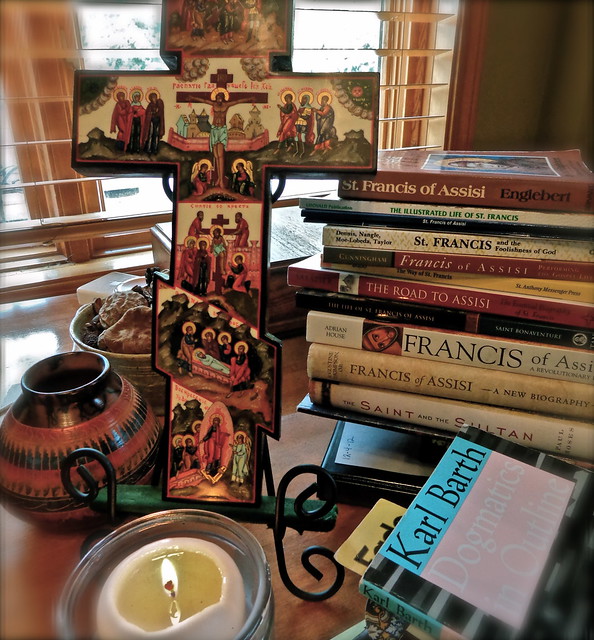A Premodern Sacramental Eclectic
A Premodern Sacramental Eclectic
Brian Zahnd
Ten years ago I was a poverty-stricken Christian…and I didn’t even know it. My poverty was theological and it was the sad consequence of my arrogant sectarianism. By restricting my Christianity to the narrow confines of modern charismatic evangelicalism I suffered from a self-inflicted theological poverty. I needed the riches of the whole church. I needed to be able to draw upon the broad spectrum of Christian thinkers and theologians, mystics and writers. I needed to become eclectic in my approach to Christianity. A Christianity that is sufficiently broad and eclectic liberates us from an arrogant and impoverished sectarianism.
In my youthful arrogance (the word I really want to use is stupidity) I effectively defined and limited Christianity to my kind of Christianity — a charismatic flavored evangelicalism. As far as I was concerned, most Catholics, Orthodox, Anglicans, and mainline Protestants needed to “get saved” — which is to say, they needed to become my “style” of Christian. There were times in my twenties and thirties when I was particularly antagonistic toward Catholics and mainline Protestants. I thought Catholics belonged to the “whore of Babylon” and mainliners were all “liberal goats.” How egotistical! How stupid! I’m ashamed of all that now. I have repented. Which means I’ve called my former attitude sinful and changed my mind — I simply don’t think that way anymore.
Today my theological reading is pretty evenly divided between Orthodox, Catholic, Anglican, Protestant, and Evangelical writers. And whereas I want to help all kinds of people discover a vibrant personal faith in the living Christ, I feel no need to convert my Orthodox and Catholic brothers and sisters to a Protestant version of Christianity. From my vantage point I’ve come to think that Orthodox, Catholic, Anglican, Protestant, Evangelical expressions of Christianity generally have the same amount of truth — it just depends on what areas of truth you want to focus on. Yes, I actually believe this! I honestly don’t think evangelicalism has a greater claim to Christian truth than Catholicism. It’s true that I’m not entirely comfortable with the Catholic view of Mary and the practice of a male-only celibate priesthood; but I’m also not entirely comfortable with the Protestant view of Sola Scriptura and the emphasis on radical individualism. Another way of saying it might be like this: we need the whole body of Christ to properly form the body of Christ. This much I’m sure of: Orthodox mystery, Catholic beauty, Anglican liturgy, Protestant audacity, Evangelical energy, Charismatic reality — I need it all!
Over the past decade I’ve learned to worship with my Orthodox, Catholic, Anglican, and mainline brothers and sisters; I’ve found it beautiful and deeply rewarding. If my circumstances were different I could imagine myself belonging to any one of these branches of Christianity. As it is, I’m content with being an eclectic Christian…or perhaps a premodern sacramental evangelical. What I’ve found is that within the wide orthodoxy defined by the historic Christian creeds there is room for a lot of different expressions of our shared faith. As I glance around my writing table I see twelve books on Saint Francis of Assisi, an Orthodox icon, an Anglican prayer book, and Karl Barth’s Dogmatics. And I have no intention of surrendering any of these to the petulant sectarians who want to police such things.
When I was converted from sectarian to eclectic, I obtained a passport that allowed me to travel freely throughout the whole body of Christ. In my theological travels I have discovered a Christianity that has both historical depth and ecumenical width. Now I can’t imagine not being able to access all the great contributors to contemporary Christian thought. Orthodox thinkers like Kallistos Ware and David Bentley Hart. Catholic thinkers like Richard Rohr and William Cavanaugh. Anglican thinkers like Rowen Williams and N.T. Wright. Mainline thinkers like Walter Brueggemann and Eugene Peterson. Without them my Christianity would be horribly impoverished.
After my book Unconditional? was published in 2011 — a book on the centrality of forgiveness in the Christian faith — I began to receive a much wider range of speaking invitations. I spoke at a monastery to Benedictine nuns. I spoke to a group of progressive mainline pastors. I spoke at one of the largest Lutheran churches in America. I participated in a panel discussion with Catholic intellectuals in Lisbon. But not only did I speak in these different settings, I made friends among them. I was discovering how much I really like the whole body of Christ! And I have no interest in trying to convert my friends from one expression of Christianity to another. Do I think the Benedictine nuns that Peri and I visit every few months should become Protestants? Do I think the Orthodox priests I’ve come to know and love should become Pentecostals? Do I think my pastor friends among the progressive mainline Protestants should become conservative evangelicals? Of course not! We need Benedictine nuns. We need Orthodox priests. We need mainline ministers. And we may even need a few premodern sacramental eclectic pastors…or whatever it is I am.
BZ
